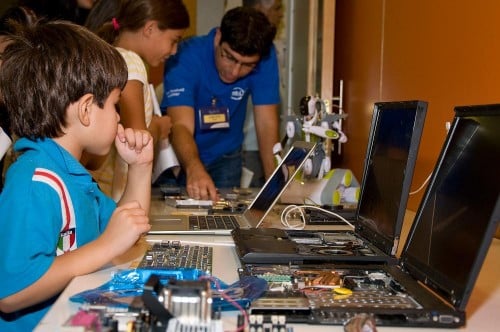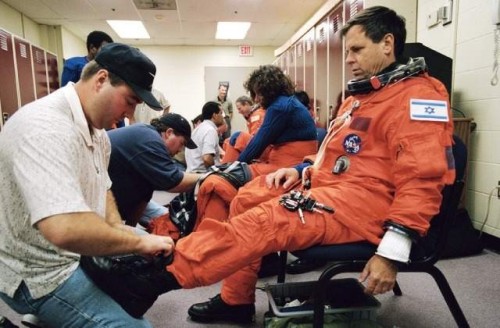This is according to a survey conducted by Geocartography for the Ministry of Science and its findings were presented at the Sixth Science Communication Conference

The public looks for scientific information in search engines and news websites and highly appreciates the importance of science to everyday life.
This is according to a survey conducted for the Ministry of Science, Technology and Space by the Geocartography company. The findings of the survey were presented by ministry spokeswoman Livy Oz, as part of the sixth science communication conference in Israel organized by the National Academy of Sciences and the Davidson Institute. Oz initiated and planned the survey together with associate professor Ayelet Baram-Zabari, an expert in science communication at the Technion.
Interest and knowledge in various subjects
The subjects in which the degree of interest is the greatest, clearly, are Health and medicine וComputing and Internet which 65% and 64% of the public, respectively, indicated that they were interested or very interested in them, and in second place Technological futurism (52%) andEnvironment (50%) on the other hand, the three topics that are of least interest to the public are printing three daysD, space and robots Of which only 26%-32% stated that they were interested in them.
Compared to previous studies, there is an increase in public interest in the fields of computing and the Internet and technological futurity, and although the level of interest in it is the lowest in the current study, an increase in interest in the field of robots is also evident. However, compared to previous studies, there is less interest in environmental quality, related issues To water And history וArchaeology.
The two subjects in which the perceived level of knowledge is the highest are "computing and the Internet", and "health and medicine". It is also worth noting that while the degree of interest in the fields of history and archeology is not high, the perceived level of knowledge in these fields is placed fourth of all the subjects examined. Also, similar to the degree of interest, the three subjects in which the level of knowledge is the lowest are space, XNUMXD printing, and robotics, and this by a clear margin compared to the other subjects examined in this context. Compared to previous studies, the current study shows an increase in the perceived level of knowledge in the fields of computing and the Internet, technological futurism and robotics.
The degree of interest of women in the subjects of computing and the Internet, technological futurism, water, energy, 8D printing and robots is significantly lower than that of men, and the degree of interest of residents from the Arab sector is significantly higher than the degree of interest of residents from the Jewish sector in 11 of the XNUMX topics examined In this context.
Depending on the degree of interest, women report that their level of knowledge in most subjects is lower than the level of knowledge that men report, except in the fields of health and medicine. Also, with the increase in age, there is an increase in the perceived level of knowledge on the issues of environmental quality and water, but a decrease in connection with the issues of computing and the Internet and the technological future.
The use of different sources of information and the perception of their reliability
The two most frequently used sources of information are Internet search engines and Internet news sites, 81% and 77% respectively of the public stated that they use them very often or fairly often, with a distinct difference to all other sources of information. Correspondingly, internet search engines are also ranked relatively high in terms of the perception of reliability.
However, it is evident that there is no strong relationship between the frequency of use and the perception of the reliability of different information sources. For example, although scientists at universities, science museums and scientific newspapers are seen as relatively reliable sources of information, the frequency of their use is very low, compared to social networks, which are seen as less reliable, but used more frequently. With the increase in the level of education, there is an increase in the perception of the credibility of scientific newspapers and scientists in universities, government offices and public places, along with a decrease in the perception of the credibility of religious people. Also, among those with a secondary education and below, the perception of the reliability of other people in their environment is lower than among those with a higher education.
With the increase in age, there is a decrease in the frequency of using other people and scientists in universities as a source of information, and an increase in the use of the radio, along with an increase in the perception of the credibility of the radio and the daily press. Also, among young people up to the age of 34, the perception of the credibility of scientific newspapers, television and news sites is distinctly low.
The perception of the importance of knowledge about science and technology
62% of the public believe that they need knowledge to a great extent to a great extent about science and technology issues in their day-to-day lives. Men (69%) and residents from the Arab sector (86%) believe at a higher rate that they need knowledge of science and technology in their daily lives, compared to women (54%) and residents from the Jewish sector (56%).
Perceptions towards different occupations
Of the professions examined, doctors and scientists are seen as the professions that contribute the most to the country's resilience and are the most prestigious. On the other hand, senior businessmen, intellectuals and cultural figures and leading entertainers are seen as having the least contribution to the country's resilience, but the profession ranked as the least prestigious is clergy. Although they are placed third and fourth after doctors and scientists in terms of contribution and prestige, in terms of willingness to recommend, the high-tech and engineering professions were listed in first place next to doctors, with a clear gap compared to other professions examined, including scientist and businessman.
Compared to the Jewish sector, among the Arab sector, the perception of the contribution of senior doctors, senior technology and engineering people in the business sector, high-tech people, spiritual and cultural people, and leading entertainment people is greater, but the perception of the contribution of military personnel is lower.
General knowledge of science
In general, between 60% and 90% of the public knew how to correctly answer each of the sentences in the fields of science they were asked about, when compared to the United States, a higher proportion of the public in Israel knew how to correctly answer five out of seven sentences tested in both countries. However, compared to the United States, a lower proportion of Israelis were able to state that the sentence "The sun revolves around the earth” is wrong (69% vs. 74%). The sentence that was answered correctly at the highest rate is "Horoscope is an exact science", which 90% of the public stated was incorrect, while the sentence that was answered correctly in the lowest proportion (although not by a significant margin) is "Small electrons are atoms” which 60% of the public stated was true. A significantly higher proportion of the men knew how to correctly answer five of the eight sentences tested, while a higher proportion of the women answered two sentences correctly.
Naturally, with closer to religion, a dramatic decrease in the degree of agreement with the sentences is evident: "The universe began with a huge explosion"And"Humans evolved from earlier creatures".
Children's participation in science activities

Close to half of those who have children aged 6-18 claim that their children participate in any activities in the field of science, when as the age decreases, the children are more exposed to activities in the field of science, especially in elementary school.
Support for sending an astronaut into space
65% of the public believes thatIsrael should launch an astronaut (man or woman) is added to the space, when compared to a previous study, there is a clear increase in the proportion of those who think so. Stereotypes towards women in science 69% of the public do not agree at all or agree to a small extent with the concept that due to innate differences between men and women, there are more men who engage in science than women, and only 10% agree with this statement to a large or very large extent. With the increase in education, there is a noticeable increase in the proportion of those who disagree with the lawXNUMX "Due to innate differences between men and women, there are more men who engage in science than women."

One response
When we are still occupied with monstrous oppressions and a horrifying threat to our rights as women (see Shas and clerics in general + millions of other struggles), how will we be interested and engaged in what is really fun and progressive, such as technological futurism?